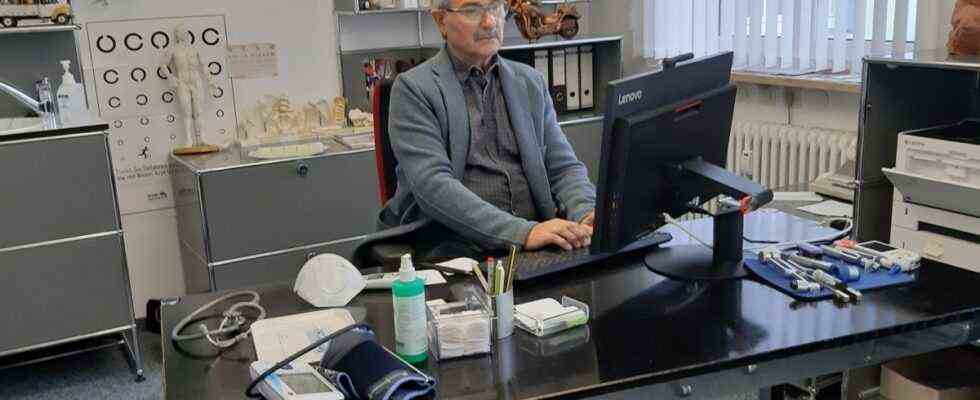“My patients received my decision with respect,” says Paul Offenberger. The doctor no longer treats more than 30 of his patients because they do not want to be vaccinated against Covid-19. A sign has been hanging on the door to the practice in Waltenhofen near Kempten for a few days: “Access only with vaccination protection, vaccination appointment or emergency”. The matter of emergencies is important, and Offenberger makes this clear right away: “In an emergency, of course, I treat everyone”, this is not only the Hippocratic Oath, but also the professional ordinance for doctors in Bavaria. And he also continues to issue repeat prescriptions for former patients, even if they are not allowed to go to the practice but have to be sent to other people – vaccinated people – to be picked up. His decision is likely to be controversial in the Allgäu, where the vaccination rate is five percent below the Bavarian and seven percent below the national average. But, Offenberger reports, the reactions have been positive so far – at least offline.
Online, of course, things look different: he has already reported an e-mail for insulting, but at least the Google ratings leave him indifferent. Holocaust comparisons, “A doctor without honor”, we know it by now. The courts too: only on Thursday did the Günzburg district court convict a man for insulting the Neu-Ulm family doctor Christian Kröner to imprisonment without parole. The convict had, among other things, described Kröner as a murderer because of his public calls to be vaccinated.
In Waltershofen, Offenberger had “a couple of sleepless nights” before the decision, but he is now fine with it. Also because the patients reacted so understandingly. “As a doctor, I have to have a relationship of trust with the patient, and if the patient does not want to take my therapy recommendation, then I cannot treat him, and he just has to go to another doctor,” he says, justifying his move. He has the obligation to deliver the therapy offer – and the patient has the obligation to take advantage of it. Or the doctor-patient contract expires. “If I want to operate on a patient with a ruptured appendix and he refuses, then I have to send him to another doctor because I cannot answer for the next steps,” says Offenberger.
The other point, of course, is the protection of his other patients and his staff. Many of his patients are older and have previous illnesses. His patients also suffered from the crowded hospitals. The urgently needed operation on a bladder cancer patient has been postponed for some time because the Kempten clinic is overburdened. And again Offenberger uses the phrase: “I can no longer answer for that.”
Basically, he is legally protected – with the emergency exception. “From a professional point of view, a doctor is basically free to refuse treatment,” explains Florian Wagle from the Bavarian Medical Association: “The decisive factor here is always the specific individual case in relation to the patient’s special situation.” The aforementioned specific individual case concerns emergencies that Offenberger continues to deal with. The doctor has of course informed himself and received support from his district association. Allegations that would also affect criminal law, such as failure to provide assistance, are therefore unfounded.
The 69-year-old has no more patience with vaccination refusals. As a young doctor, just 29 years old, he ran a clinic in Malawi, as he tells us on the phone. “I’ve seen hundreds of children die of measles, diphtheria, umbilical tetanus,” he says. This is one of the reasons why he knows very well how badly infectious diseases can be and what consequences a lack of vaccinations could have. “I had hepatitis myself, and at that time there was still no vaccine – what would I have given for the vaccination,” says Offenberger. But it is not only because of his experiences in Africa that he is in favor of a general compulsory vaccination: “It is the only way, the blood toll is simply too high.”
Just as with those who do not want to vaccinate, Offenberger is annoyed by some colleagues in Kempten who do not vaccinate themselves: “This is a scandal.” For example, some gynecologists would serve rationally unfounded fears of women wanting to have children, pregnant women and breastfeeding women about the vaccine – contrary to scientific evidence. In this respect, he also wants to understand his step: As a signal to other doctors to educate more, to vaccinate more and to build more trust.

